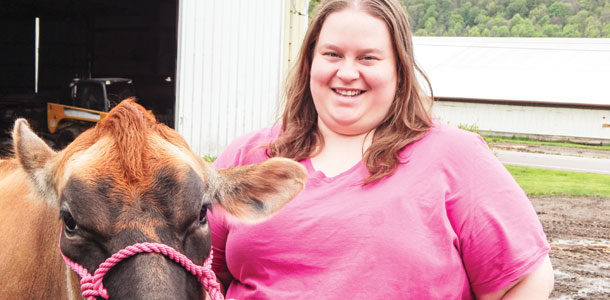The phrase “mental health” is becoming more talked about in the agriculture industry, but it’s still a subject that often leads to feelings of discomfort and embarrassment. At the Women in Dairy Conference hosted by Penn State Extension, Jessica Peters, a dairy farmer from Spruce Row Farm in Pennsylvania, opened up about her own journey with mental health through an open, unfiltered conversation about the struggles that are unique to dairy farmers.
To take some of the shame and embarrassment out of these struggles, Peters leads a “Secrets of Ag” project on social media. She said her project was inspired by a larger community project, PostSecret, that launched in 2005 and shares secrets from people who submit anonymous postcards. In addition to sharing photos and videos about her journey with mental health on social media, Peters’ “Secrets of Ag” project gives dairy farmers a safe space to be vulnerable. She accepts online submissions from agriculture professionals who want to anonymously share their secrets and give her permission to re-share them in an impactful way.
“I started sharing my journey with mental health on Instagram, and it was like free therapy for me. I wanted to find a way to make it impactful for others,” Peters explained. “I wanted to give other people that feeling of unburdening themselves and a place for them to unburden themselves without consequence.”
Individuals do not have to provide their name or contact information, but by sharing their secrets anonymously, others in the dairy industry are realizing they are not alone in their struggles. To date, she has received more than 500 secrets.
“Secrets hold a lot of power over us. The only way they lose their power is when they’re not secrets anymore. Someone else out there knowing your burden can lighten you in ways I can’t even describe,” she said. “What I didn’t realize the project would do is change my life and my perspective on life. It’s putting people in the minds of these secret-sharers. You can feel their pain.”
While Peters does not have formal mental health training and does not claim to be an expert, she understands the world of dairy farming because she lives and breathes it every day. She shared a personal look inside her journey to help individuals better understand the pain, anxiety, stress and mental fatigue many dairy farmers experience on a daily basis.
Common mental health myths for dairy farmers
Peters opened the discussion by describing some of the hesitancy dairy farm families have about starting conversations around mental health.
“Especially with farmers, I think there’s a step in between 'We don’t talk about it at all' and a professional talking about it. [The in-between step] is someone in the middle who has lived it and knows exactly what you’re feeling. I think that spurs people to decide whether they get help. That’s what I’m trying to do,” she shared.
While she said individuals are making progress by sharing inspirational messages like, “It’s OK not to be OK,” “You are enough” and “Everybody hurts,” she said these messages keep us in a comfortable box. Peters reminded the audience that mental health is often about being uncomfortable and sharing the feelings you are afraid to admit you have.
“They might be giving you inspiration, but if you don’t take it further, it doesn’t help you at all. That’s the problem. We’re not taking it further,” she explained. “You can’t just post these quotes every Monday and move on. Mental health is so much more than that.”
To step out of your comfort zone and continue breaking the stigma related to mental health, she shared two common clichés and ways dairy professionals can debunk these myths:
-
There’s no crying in baseball. “[Dairy farmers often think] you don’t cry in front of people. If it makes you feel better, I’ve done it,” she said. “I got through it and lived to tell the tale, and at the end, I felt a little better. A good cry sometimes helps, especially in the calf barn.”
- Don’t talk about fight club. “We don’t talk about it because I believe, from a very young age, we’re taught you can’t make people uncomfortable because it’s impolite. But to get through the stigma of mental health, we have to get uncomfortable. Then we have to sit in that uncomfortableness for a while. That’s not easy, but it’s completely necessary,” Peters added.
What depression actually looks like
Depression is another area of mental health that often leads to discomfort. As someone who has firsthand experience with depression, Peters said it doesn’t typically come up in normal conversation. According to Peters, most people think depression means the person struggling walks away from all priorities, cancels social engagements, cries constantly, easily breaks and has suicidal thoughts.
“All of these can be true. People do feel this. But I have to say, a big chunk of being depressed has nothing to do with these things. [From my experience], depression mostly looks like this,” she explained before giving a personal look at her symptoms of depression.
By opening up about what depression looks like for her, she said she hopes it puts individuals in the mind of another dairy farmer, family member or neighbor who might be struggling.
-
Ignoring emails and texts. “I don’t do it intentionally, but it just feels like too much responsibility to respond.”
-
Smiling instead of laughing. “A person might just smile dismissively. Their emotions are kind of regulated to an extent.”
-
Replaying songs, movies or TV shows. “In the milking parlor especially, I listen to music. One week, it kind of hit me that I hadn’t listened to music in weeks. If I’m not listening to music, something is wrong. On the other hand, when I’m feeling really bad, repetition is big. That’s because there is no risk in re-watching my favorite show or replaying my favorite song. I know exactly what I’m getting with them.”
- A decrease in happy emotions – not necessarily an increase in sad ones. “Most of the time, depression is a decrease in happy emotions. Sometimes it’s just numbness. Imagine not feeling any of those happy emotions. Everyone tells you to focus on the good. That can help, but what if you can’t feel the good and can’t find it? What do you focus on? Then it gets darker from there. Nothing feels OK, but you’re still walking around as if everything is fine,” she said.
How to avoid isolation as a farmer
During the discussion, she also opened up about one of her biggest worries that often leads to isolation: Why would they want to be around me if I don’t want to be around myself?
“Farming feeds into that because it’s such an isolating profession. How many times do you want to call someone but then think, ‘I don’t have long enough to talk to them or they’re probably busy milking cows,” she said. “You don’t call them and, eventually, you isolate yourself. I constantly push people away. I’m working on it, but it’s not an easy thing to change.”
While dairy farming can be very isolating, Peters said having close connections, even with just one or two close friends, can help you overcome the voice inside your head that could be spurring anxiety and depression.
“[People will say] ‘You have friends and family who support you.’ That’s wonderful. I believe them. But that voice in my head is constantly talking to me even when those people aren’t there,” she said. “The other night, a friend had to tell me something that in my heart I knew was true, but my head kept telling me was wrong. To hear her say it out loud, I just needed someone else to say it.”
Mental health is everywhere. Suicide is real. Most people don’t talk about it, and in the world of dairy farming, it is extremely easy to become isolated. There are varying degrees of what struggles someone might be facing, but Peters reminded the farming community that you are not alone.
“Everything you’ve ever felt, someone else is feeling it too. They may have gotten there differently, but as someone who has read 500 people's thoughts, you are not alone in what you’re feeling,” she added. “I know it’s really hard to take time for yourself, but you have to work at it. It takes effort to change the voice in your head and the way you think about yourself and others. It takes strength and time, but you will never regret it.”







